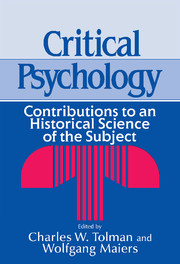Book contents
- Frontmatter
- Contents
- Preface
- Acknowledgments
- Contributors
- Critical Psychology
- 1 Critical Psychology: An Overview
- 2 Critical Psychology: Historical Background and Task
- 3 Societal and Individual Life Processes
- 4 Experience of Self and Scientific Objectivity
- 5 Psychoanalysis and Marxist Psychology
- 6 Emotion, Cognition, and Action Potence
- 7 Action Potence, Education, and Psychotherapy
- 8 Personality: Self-Actualization in Social Vacuums?
- 9 The Concept of Attitude
- 10 Client Interests and Possibilities in Psychotherapy
- 11 Play and Ontogenesis
- 12 Functions of the Private Sphere in Social Movements
- Bibliography
- Index
7 - Action Potence, Education, and Psychotherapy
Published online by Cambridge University Press: 21 March 2010
- Frontmatter
- Contents
- Preface
- Acknowledgments
- Contributors
- Critical Psychology
- 1 Critical Psychology: An Overview
- 2 Critical Psychology: Historical Background and Task
- 3 Societal and Individual Life Processes
- 4 Experience of Self and Scientific Objectivity
- 5 Psychoanalysis and Marxist Psychology
- 6 Emotion, Cognition, and Action Potence
- 7 Action Potence, Education, and Psychotherapy
- 8 Personality: Self-Actualization in Social Vacuums?
- 9 The Concept of Attitude
- 10 Client Interests and Possibilities in Psychotherapy
- 11 Play and Ontogenesis
- 12 Functions of the Private Sphere in Social Movements
- Bibliography
- Index
Summary
Theoretical absolutization of the situation for people whose relevant living conditions seem unalterable, leaving only psychological modes of adjustment, must surely occur in other areas of practical psychological application. This is certainly the case in education, which, in the ruling interests, must also serve to reproduce the attitudes that make it possible for adults to accept or at least tolerate their alienated existence in production. I shall present some ideas of Kurt Lewin's as an example.
Isolating the Subjective Situation from Its Objective Causes as an Educational Strategy of Conflict Avoidance for the Preparation of Children for Self-Management Within Dependence: Lewin
The basic concept of Lewin's famous “field theory” is “life space,” that is, the world that is for any particular person psychically real and effective. It is distinguished from the objective world, which is regarded as psychologically irrelevant. Lewin developed a complicated, partly mathematized model of forces, vectors, attractions, zones, mental limits and barriers, psychic locomotions, and so forth, within the life space, from which particular constellations of motives, attitudes, and behaviors of the individual and their changes were supposed to be derivable. The idea that the individual's relevant life conditions are unalterable is thus implicit in the theory. Only the psychic movement of an individual within a given life space is taken into account, not the individual's influence on it. The objective relations that determine the life space are excluded from the concern of psychology from the outset, so their alteration cannot be understood as a psychological problem at all.
- Type
- Chapter
- Information
- Critical PsychologyContributions to an Historical Science of the Subject, pp. 134 - 159Publisher: Cambridge University PressPrint publication year: 1991
- 2
- Cited by



